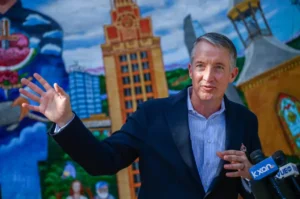UT-Austin Presidency Left Vacant as Texas Public Universities Face Rising Political Challenges
The University of Texas at Austin (UT-Austin) now faces uncertainty after President Jay Hartzell announced his decision to step down and lead Southern Methodist University (SMU), a smaller private institution in Dallas. Many were surprised by this announcement on Tuesday, but Holden Thorp, a former public university leader, found it unsurprising.
Thorp resigned as chancellor of the University of North Carolina at Chapel Hill in 2012 due to political interference and legislative challenges. He later transitioned to Washington University, a private institution, to escape such issues. Reflecting on Hartzell’s decision, Thorp views it as an indication of the growing difficulties university presidents encounter in navigating today’s political climate.

Political Pressures Intensify for Texas Universities
Texas public universities are grappling with increased scrutiny from conservative leaders. The state recently banned diversity, equity, and inclusion (DEI) offices, creating friction between university administrators, lawmakers, students, and faculty. While GOP leaders accuse universities of not enforcing the ban adequately, critics argue administrators have gone too far.
In recent years, Texas GOP leaders have targeted perceived liberal ideologies in higher education. Efforts to ban tenure, regulate faculty senates, and control curriculum have compounded the challenges for university leaders. For instance, Texas A&M University faced turmoil when its president, Kathy Banks, resigned after a hiring controversy involving a journalism professor perceived as left-leaning.
These challenges extend beyond Texas. A 2022 survey by the American Council on Education revealed that 55% of university presidents plan to step down within five years. University leaders cite political interference, budget deficits, and the lingering effects of the COVID-19 pandemic as key reasons.
Why Hartzell Left University of Texas-Austin
In an interview with the Dallas Morning News, Hartzell denied that political pressures pushed him to leave UT-Austin. However, he acknowledged he would not miss frequent trips to the Texas Capitol. At SMU, he anticipates more flexibility and confirmed that he has no plans to eliminate the university’s DEI office.
Hartzell’s decision has raised concerns among UT-Austin faculty, who fear the university may face more aggressive legislative actions during the upcoming session. Lawmakers could broaden the DEI ban to academic programs or curtail faculty senates’ influence, faculty members warned.
Michael Harris, an SMU education policy professor, pointed out the difficulty of leading a flagship public university in Texas. “I’d worry who would want that job,” Harris said, noting the challenges Hartzell and his predecessors faced with state lawmakers.
What’s Next for UT-Austin?
Hartzell’s departure has sparked debate about the type of leader UT-Austin needs next. Faculty advocate Pauline Strong, president of UT-Austin’s chapter of the American Association of University Professors, emphasized the importance of hiring a president who will uphold academic and speech freedoms.
Some conservative leaders view Hartzell’s exit as an opportunity to appoint someone aligned with their values. State Rep. Brian Harrison (R-Midlothian) expressed hope for a “bold conservative leader” who would prioritize workforce education and end “liberal indoctrination.”
In Republican-led states like Florida, universities have increasingly hired leaders with political rather than academic experience. Critics warn that while former politicians may excel at fundraising, they often lack expertise in managing university operations.
A Sign of the Times
Holden Thorp believes Hartzell’s decision to leave UT-Austin reflects broader challenges facing public university leaders today. Private universities offer less political interference, making them more appealing to leaders in search of stability.
“Research universities like UT-Austin are invaluable to the nation,” Thorp said. “It’s unfortunate that the political climate makes it more appealing to lead smaller institutions.”
As UT-Austin begins its search for a new president, the decision will have far-reaching consequences for the university’s academic mission, political environment, and role as a leader in higher education.
